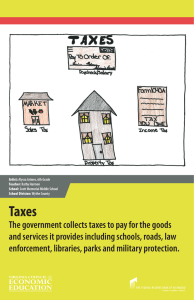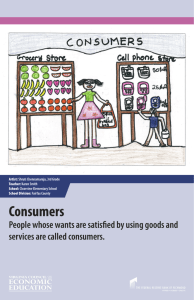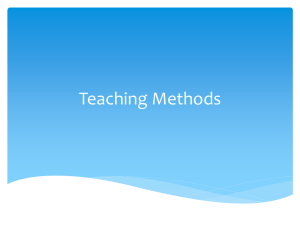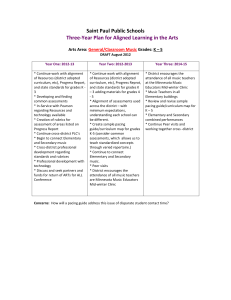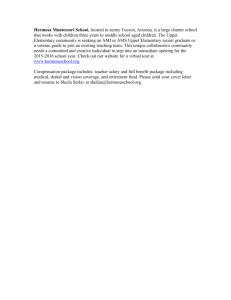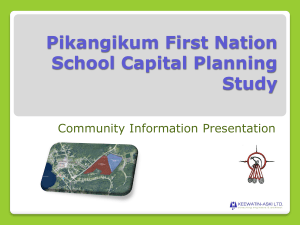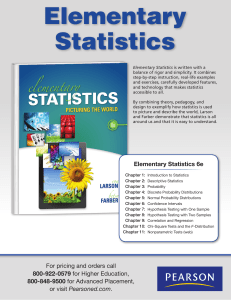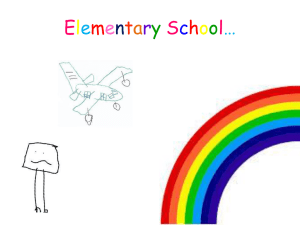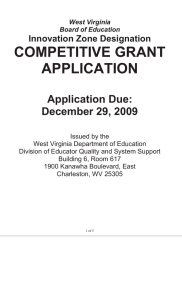Services - Federal Reserve Bank of Richmond
advertisement
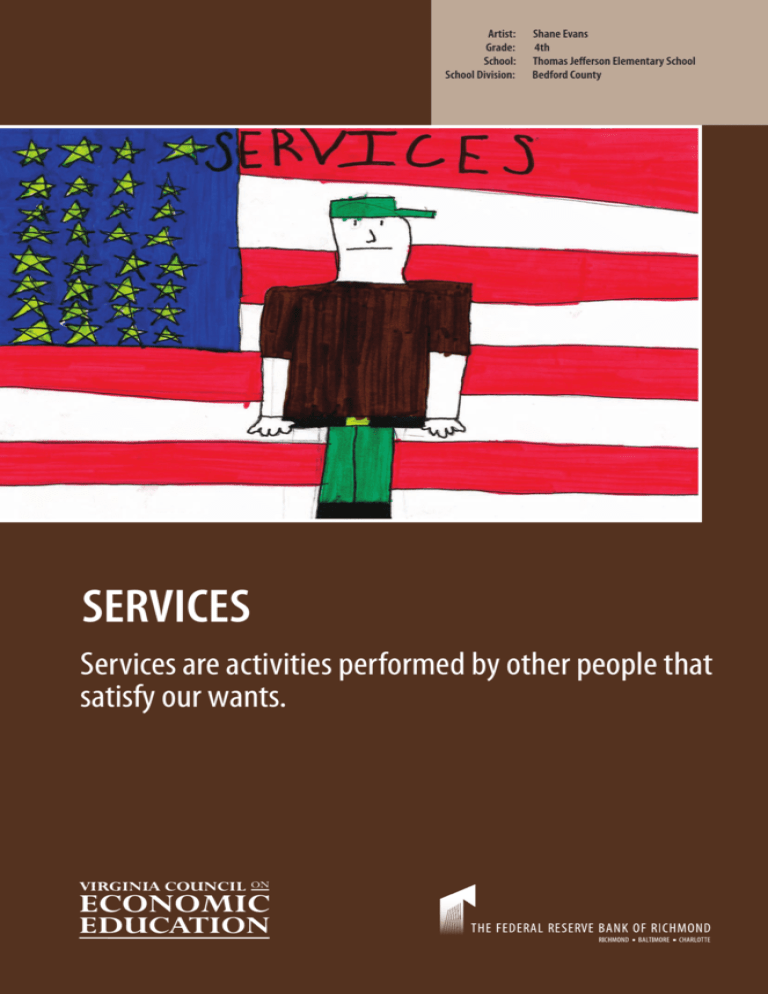
Artist: Grade: School: School Division: Shane Evans 4th Thomas Jefferson Elementary School Bedford County SERVICES Services are activities performed by other people that satisfy our wants. SERVICES Definition/Background Services are activities performed by other people that satisfy our wants. Examples include washing cars, teaching economics, coaching football and acting in movies. Goods can also satisfy people’s wants. The difference between goods and services is that goods are objects (tangible) while services are actions (intangible). Services must be provided and goods must be produced. It’s important for students to understand that they don’t just appear. People (human resources) use their skills (human capital) to provide services. Natural and capital resources may also be used in the production of services. Since productive resources are limited (scarce), a producer of services must choose which services to produce and which to forego; thus, producers, like consumers, face choices and incur opportunity costs. VCEE is a nonprofit organization providing Virginia’s K-12 teachers with professional development, quality curriculum and other resources to promote economic and financial education. Visit www.vcee.org or contact VCEE or one of its affiliated centers for economic education to learn about specific opportunities. Teaching Ideas VCEE Network Contacts 1. Instruct the students to write the letters of the alphabet vertically on a piece on paper. Give them five minutes to write down a service for each letter. Create a class list using their ideas. 2. Display things such as scissors, combs, spoons, paintbrushes and keys and ask“What service can be produced using these items?”Create a list of all acceptable responses. 3. Explain to the students that an inexpensive gift to give a parent or sibling would be a coupon book containing various services the student could perform for the recipient. For example:“This coupon is good for raking the lawn.”Encourage students to make their own coupon books. 4. Take the students on an investigative tour of the school. Their goal is to identify all the services they can. Develop interview questions and allow students to interview the people at school who provide services. 5. Use old magazines to create collages depicting workers involved in various services. Lessons & Resources Print Lessons Choices and Changes: Grades 2-4, Lesson 7: Goods and Services, Work and Workers (elementary) Master Curriculum Guides in Economics: 3-4, Lesson 2: Service with a Smile (elementary) Online Lessons Goods and Services (elementary) http://www.econedlink.org/lessons/index.cfm?lesson=EM642&page=teacher Community Helpers are at Your Service (elementary) http://www.econedlink.org/lessons/index.cfm?lesson=EM454&page=teacher Goods and Services: Some are Private, Some are Not (middle) http://www.ncee.net/ei/lessons/OldMac/lesson2/ VCEE Sarah Hopkins Finley (804) 828-1211 shfinley@vcu.edu Old Dominion University Ruth Cookson (757) 683-5570 rcookson@odu.edu Christopher Newport University Gemma Kotula (757) 594-7404 econedu@cnu.edu Radford University Ermie W. Wade (540) 831-5890 ewwade@radford.edu George Mason University Rachel Powell (703) 314-0226 gmupowell@yahoo.com University of Virginia’s College at Wise Gary Stratton (276) 328-0223 grs6j@uvawise.edu James Madison University Lynne F. Stover (540) 568-3248 stoverlf@jmu.edu Lynchburg College Cheryl Ayers (434) 544-8791 ayers.c@lynchburg.edu Fed Resources Virginia Commonwealth University Suzanne Gallagher (804) 828-1628 sgallagh@vcu.edu Virginia Tech Barbara Taylor (540) 231-1147 bjtaylor@vt.edu Piggy Bank Primer (elementary) http://stlouisfed.org/education/resourcetools Potato: A Tale from the Great Depression (elementary) http://stlouisfed.org/education/lesson plans/ Potato.pdf Literature • Critter Sitter by Chuck Richards. Walker, 2008. Henry discovers that his pet-watching service can be much more difficult than he first thought. [Grades K-3] • Jack of All Tails by Kim Norman. Dutton Children's Books, 2007. Creative Kristi Kibbleman persuades her family to start a business that helps people with their pet problems. [Grades K-3] • The City of Ember by Jeanne DuPrau. Random House, 2003. When Lina and Doon turn 12 they receive their lifetime job assignments. She becomes a messenger and he is sent to work on the city’s failing generator. [Grades 4-7] • Potato: ATale from the Great Depression by Kate Lied. National Geographic Society, 1997. Set during the "Great Depression," a family finds temporary employment digging potatoes in Idaho. [Grades K-2] The Virginia Council on Economic Education, in cooperation with The Federal Reserve Bank of Richmond, is pleased to provide this poster featuring a winning entry from the 2008-2009 Color the Economic Concepts Contest. Teachers in Grades K-8: Give your students the opportunity to illustrate their knowledge of economic concepts in a creative and fun way. They may be selected for a poster next year! Winning students also receive a $50 U.S. Savings Bond. Entries must be received by April 30, 2010. See www.vcee.org for more details. For more resources on teaching economics and the Federal Reserve System go to www.richmondfed.org/educational_info. Among these free and easy to use resources you’ll find lesson plans, workshop information and publications. Lis Turner Economic Education Specialist Lis.Turner@rich.frb.org (800)526-2031 (804)697-8135
